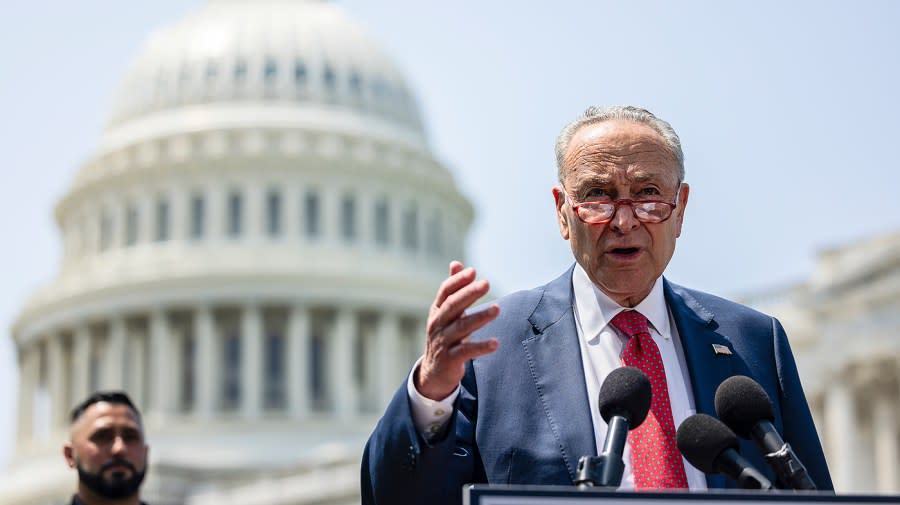Senate passes annual defense bill, teeing up showdown with House

- Oops!Something went wrong.Please try again later.
The Senate on Thursday night passed its version of the National Defense Authorization Act (NDAA), teeing up a looming effort to find a deal on a compromise bill that satisfies the Democratic Senate and Republican House.
Senators voted 86-11 on the bill, which authorizes a topline figure of $886 billion for fiscal 2024, the total that was included in the debt ceiling deal struck between the Biden administration and House Republicans.
The package passed with little drama after the Senate kicked off consideration of the bill and amendments early last week. Senate Majority Leader Chuck Schumer (D-N.Y.) has repeatedly called on the chamber to move the process along in a bipartisan fashion.
Six Democrats — Sens. Cory Booker (N.J.), Ed Markey (Mass.), Jeff Merkley (Ore.), Elizabeth Warren (Mass.), Peter Welch (Vt.) and Ron Wyden (Ore.) — voted against the bill, along with Sen. Bernie Sanders (I-Vt.). Four Republicans also opposed the package: Sens. Mike Braun (Ind.), Mike Lee (Utah), Rand Paul (Ky.) and JD Vance (Ohio).
Schumer was trying to avoid anything resembling what took place in the House, when Republicans passed a version of the bill that included a number of GOP-led provisions, turning the normally bipartisan annual affair into a near-party-line vote.
Among them are items that would block the Pentagon’s new policy that covers travel costs for military members who seek abortions, take aim at military diversity programs and bar funding for surgeries and hormone treatments for transgender troops.
“We’ve had an open and constructive amendment process for the NDAA, with both sides … working together in good faith. This is exactly how the process for the NDAA should look: bipartisan [and] cooperative,” Schumer said on the Senate floor Thursday morning.
“What’s happening in the Senate is a stark contrast to the partisan race to the bottom we saw in the House,” Schumer said, noting that many of the items they included have little chance of being included in a final version later this year. “House Republicans should look to the Senate to see how things get done. … They are throwing on the floor partisan legislation that has no chance of passing. The contrast is glaring.”
Included in the bill is a 5.2 percent pay increase for military personnel, $9.1 billion for various measures aimed at competitiveness with China and $300 million for Ukraine.
Schumer on Thursday evening locked in a time agreement in order to finish work as lawmakers were champing at the bit to start the August recess, which will begin Friday and last through Labor Day weekend.
Senators wrapped up work Thursday and voted on a series of amendments, having OK’d 25 amendments overall for the NDAA. Lawmakers also greenlighted a second manager’s package that includes 49 more amendments.
While the process went smoothly this time around, the real show will be in the coming months, as both chambers attempt to reconcile the two proposals and pass an overall NDAA package that can emerge through the Senate with the requisite 60 votes.
Already, things are tilting in the Senate’s direction, as provisions related to abortion and the culture wars are expected to be watered down. A final bill will need to be nailed down by the time members leave for Christmas.
However, the process did not go off without any hitches. An effort led by Sen. Amy Klobuchar (D-Minn.) to attach an item to give permanent residency to roughly 80,000 Afghans who’ve come to the U.S. following the country’s fall two years ago failed over opposition from top Republicans.
Sen. Tom Cotton (R-Ark.) maintained a hold on Klobuchar’s bill, with Senate Republicans arguing that while they support the idea generally, the Minnesota Democrat’s proposal was too broad. Cotton has a bill of his own he is pushing that would create a pathway to residency for Afghan evacuees, but it would hamper the ability of the president to grant humanitarian parole.
“This is our moment,” Klobuchar said on the Senate floor Wednesday night. “We have had two years to show the world whether or not we’re going to stand with those that stood with us. … The decision we make right now of whether we live up to the covenant we made to our Afghan allies is going to reverberate militarily and diplomatically for longer than any of us will serve in this body,”
One Senate Republican told The Hill that while Klobuchar’s Afghan Adjustment bill was unsuccessful this go-around, a limited version will likely make its way into the final NDAA product later this year.
For the latest news, weather, sports, and streaming video, head to The Hill.

